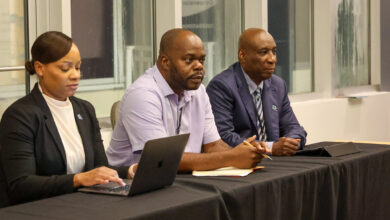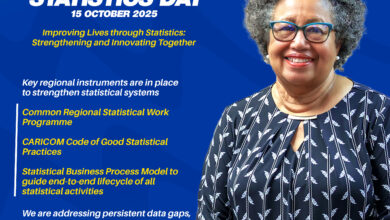(CARICOM Secretariat, Turkeyen, Greater Georgetown, Guyana)It is with pleasure that I accepted the opportunity to address you today. The Secretary General has asked that I convey to you his sincere regrets that prior commitments do not make it possible for him to be here especially when His Excellency President Ramoutar, CARICOM’s lead Head of Government for agriculture is present to address you.
Mr Chairman, the past and the current soaring food prices are continuing reminders that the Region has no choice but to pay increasing attention to food and nutrition security and cost-efficient sustainable production. It underscores the significance of agriculture to the development of the Caribbean Community.
The renewed emphasis being placed on agriculture is not only to counter rising food prices but also to ensure that regional production is available for consumption, that we are nutrition secure and that we reverse the high incidence of Chronic Non-Communicable Diseases (NCDs) now prevalent in the Region. There is therefore the need to influence the taste and preference of our households to consume nutritionally balanced foods.
CARICOM has, as have many other regions, faced the rising real cost of food to consumers, the continued down turn in remittances from abroad occasioned by the prolonged global economic crisis, the macroeconomic and other costs arising from a high and growing food import bill and the increasing health costs of treating non communicable diseases associated with nutritionally poor diets. These challenges made it urgent and necessary for CARICOM to develop its Regional Policy on Food and Nutrition Security which our Ministers of Agriculture in the Council for Trade and Economic Development adopted in 2010 with an Action Plan in 2011. In fact, since 2009 our Heads of Governments in the Liliendaal Declaration on Agriculture and Food Security at this very Convention Centre, reaffirmed their commitment to achieve the Food and Nutrition Security goal of the Region’s Common Agricultural Policy established under the Revised Treaty of Chaguaramas in 2001.
This important milestone of a Regional Food and Nutrition Security Policy was reached through a collaborative approach with Member States and regional institutions and the CARICOM Secretariat, supported by the FAO. The Action Plan to implement the Policy works towards a rapid transformation of the Region’s rural and agricultural sector and its renewal as a vibrant and productive economic sector with an enhanced role and contribution to our economies. The Action Plan is geared to having this sector evolve as an important driving force in expanding livelihood options for rural people, enhancing employment and income opportunities, and improving food security and the nutritional status of people in the CARICOM Member States.
As the Heads of Government recognised in the Liliendaal Declaration, the challenges we face in ensuring our food and nutrition security are multi-dimensional and require an urgent and coherent response on a broad front covering the food production, as well as the trade, health, education and social welfare sectors of our economies. This need for Food and Nutrition Security has emphasised the need for our Member States to readjust the focus of their policies, programmes and investments at national and regional levels to include ensuring stable supplies of food for their citizens, with the highest possible proportion of local content and value added.
Further, since a major problem in CARICOM, as in many other places, is the problem of access to food that is compounded by just plain bad nutrition habits resulting in obesity and Non Communicable Diseases, it is clear that immediate, urgent problems concern household access and nutritional adequacy. This means a departure from equating food security with food availability. The Regional Policy introduces the aspects of food access, safety, stability of supply, and nutritional security, health and well-being, viewed from the perspective of the consumer also and not solely that of the producer, as had traditionally been the tendency. And viewing this from the perspective of the consumer brings us again to the focus of this Working Group – achieving a hunger free Latin America and the Caribbean. As we are all aware, the contributing factors to hunger are complex, but, Ladies and Gentlemen, a fundamental cause of hunger is that people cannot afford to buy the food they need, and they lack the land and other resources necessary to produce food for themselves. To address the issue of affordable food and food production in a sustainable manner and make progress in reducing hunger, an equally diverse set of actions is needed for success. Mr Chairman, from a CARICOM perspective, action is needed in some key areas and I would like to conclude my remarks by referring to a few of these which I hope could be part of the back drop for the debate of this Working Group. In addition to • implementation of the Region’s Food and Nutrition Security Policy; and • the need for more substantive progress in addressing the key binding constraints to competitive agriculture identified in the Jagdeo Initiative relating to, for example, SPS, risk management, land and water resource management, research for development, marketing, human resource development and financing there is:
1. The need to pay more attention to post-harvest losses where as much as 40-50 per cent in some Member States is lost to post-harvest problems. If those losses are minimized, obviously the average income earnings in agriculture would increase.
2. Given the aging farming population, a special focus on the involvement of youth in agriculture is needed to get them on board as agriculture entrepreneurs. To attract youth to the sector, there is need to modernize the image of agriculture from the traditional image of agriculture as somebody with a cutlass or a hoe in his hand, boots on his feet and torn pants to modern agriculture that requires the use of modern technology and a number of related services.
3. A holistic approach to cushion the most severely affected which will require careful monitoring as well as efficient, well targeted safety nets. While an effective response over the medium to long term must also include an increase in food production and the reduction of distribution costs.
The Working Group will need to be bold and ambitious in determining the steps needed to be taken to achieve our goals, identifying what obstacles are standing in our way, and who should address them and how. A positive outcome would be a fitting tribute to the Government and people of Guyana for undertaking to host this prestigious meeting, the first time in a Caribbean country. The Region as a whole is extremely grateful to Guyana for accepting this challenging task and executing it so successfully.
The CARICOM Secretariat would also like take this opportunity to thank FAO for its leadership and support in organizing this timely meeting in collaboration with the Government of Guyana and the CARICOM Secretariat. We also greatly appreciate the substantial and useful technical cooperation and policy support that the Secretariat and CARICOM have been receiving from FAO with funding from the Government of Italy and with the further support now commencing from the Government of the Kingdom of Spain under the Hunger-Free Latin America and Caribbean Initiative.
We view this VI Working Group Meeting as a milestone in what will be a continual process of discussion and decision making. We do look forward to productive deliberations
Thank you.





